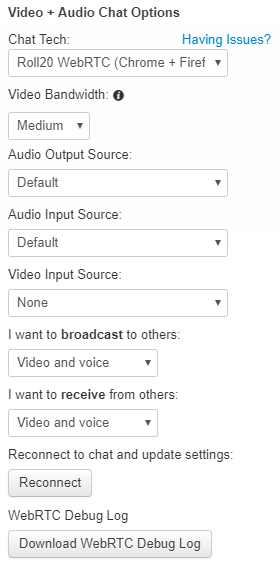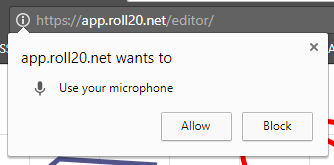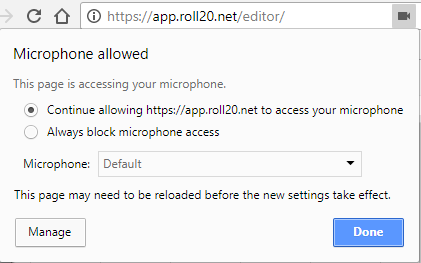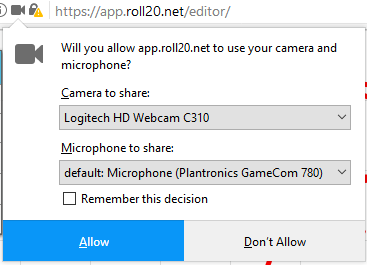Difference between revisions of "Video and Voice Chat/Troubleshooting"
From Roll20 Wiki
Juniper L. (Talk | contribs) |
m (→Enabling Firefox Permissions) |
||
| Line 77: | Line 77: | ||
====Enabling Firefox Permissions==== | ====Enabling Firefox Permissions==== | ||
[[File:Firefox_Device_Permissions.png|framed|"Firefox AV Select"]] | [[File:Firefox_Device_Permissions.png|framed|"Firefox AV Select"]] | ||
| − | #When the VTT loads for the first time, you'll be asked to Allow or Deny Microphone and Camera permissions from a drop down menu in the upper left hand corner of the screen. | + | #When the VTT loads for the first time, you'll be asked to Allow or Deny Microphone and Camera permissions from a drop down menu in the upper left hand corner of the screen. (If you don't get an Allow or Deny pop up, check the preferences at the about:config page. Make sure media.peerconnection.enabled is set on true. If it is still not working, check other media.peerconnection.* preferences like media.peerconnection.video.enabled) |
#If not, click on the red ''Camera'' or "Microphone" icon in the upper left hand corner of the address bar next to the ''Back'' button. | #If not, click on the red ''Camera'' or "Microphone" icon in the upper left hand corner of the address bar next to the ''Back'' button. | ||
# Click the X beside the Use The Camera/Use The Microphone to reset your permissions so this pop up will appear again after a browser tab refresh | # Click the X beside the Use The Camera/Use The Microphone to reset your permissions so this pop up will appear again after a browser tab refresh | ||
Revision as of 18:04, 4 May 2020
Attention: Roll20 is no longer maintaining this document on the community wiki. For the most up-to-date information please visit this page on our Help Center for assistance: Here. For more information you can email us at Team@roll20.net
If you're experience technical difficulties with Roll20's Built-In Video and Voice Chat, please review the following tips and steps to fix your issues.
Contents |
How is WebRTC different from Discord, Google Hangouts, Skype, etc?
WebRTC is a HTML5 technology that runs video and voice through a web browser without the need of a java applet. Applications like Skype or Discord aren't browser-based and therefore have access to hardware acceleration and data compression that Roll20 cannot take advantage of. Those applications use a Client/Server or All-to-One-to-All connection rather than a Peer-to-Peer connection. With an "All-to-One-to-All" connection, applications like Skype send your video/voice data one time to their server which then carries that load of data to each of the other people in the call. With "Peer-to-Peer", you are sending your video/voice data again to each peer connection in the call. This means that the upload bandwidth cost for a WebRTC call is higher than other VOIP options in anything more than a two person call. This higher upload bandwidth cost can result in stability problems for users with low upload bandwidth connections.
Roll20 WebRTC Bandwidth Requirements
Roll20 WebRTC can only be used in web browsers that natively support it. Roll20's officially supported browsers, Chrome and Firefox, are both compatible. A Roll20 WebRTC call has a suggested download and upload bandwidth of 512Kbps per additional user in the chat. That means that in a six person call (five users other than yourself), you would need around 2.5Mbps of bandwidth for a stable call. If your group has members whose connections cannot support these requirements we suggest using a 3rd party, non-browser based chat option, that can make use of both hardware acceleration and data-compression to lower bandwidth requirements.
Check My Settings
If you or your players are experiencing issues with video and voice, the first thing everyone should check is the Video + Audio Chat Options under the My Settings tab of the Sidebar.
Chat Tech
The GM should have Chat Tech either set to Roll20 WebRTC (Chrome + Firefox) or Legacy Roll20 WebRTC(deprecated) selected in order for WebRTC to activate. If Chat Tech is set to None (no audio/no video) a WebRTC call will not initiate call connections between players.
If you are still using the Legacy Roll20 WebRTC(deprecated) option and are still suffering audio and video problems, we recommend swapping over to the more modern Roll20 WebRTC (Chrome + Firefox) option.
Broadcast and Receive Settings
Everyone (GM and Players) should check their settings for I want to broadcast to others as well as I want to receive from others to see if video and/or voice has been unintentionally disabled here.
Output and Input Sources
Check that the correct devices are being used for video and voice. Audio Output Source selects the speaker device you wish to hear voice with. Audio Input Source selects the microphone device you wish to speak with. Video Input Source selects the webcam you wish to capture video with. Note that the Audio Output Source drop-down menu is not available unless an a call is already active.
When in Doubt, hit the Reconnect Button
Always click on the Reconnect Button if you make any device input/output or broadcast/receive settings. Beyond that, often if a video or voice problem occurs, hitting the Reconnect button can often fix a broken connection that failed silently in a call.
Browser Settings
At present, Roll20 only fully supports Firefox and Chrome web browsers for our VTT. Other browsers may be able to handle WebRTC with little to no issues, but we can't devote reliable tech support for them if you do run into any issues.
Keeping your Browser Up to Date
It's generally a good idea to keep your browser updated to take advantage of browser bug fixes and optimization measures.
Updating Chrome
- Click on the More Button (vertical row of three dots icon) in the upper right hand corner.
- Click on the Help option from the resulting drop down menu.
- Click on About Google Chrome option from the secondary drop down menu that appears.
OR
- Paste
chrome://settings/helpinto the URL bar and hit Enter.
Either method will open Chrome's "About" page that will inform you of your current browser version and will automatically prompt you to update to the latest stable version if you're not using it. Relaunch your browser when prompted after the install.
Updating Firefox
- Click on the Menu Button (three horizontal lines icon) in the upper right hand corner.
- Click on ? icon at the bottom of the drop down menu.
- Click on About Firefox from the resulting roll out menu.
- Firefox will tell you your current browser version and automatically prompt an update to the latest stable version if you're not using it. Click the Restart to Update button if necessary.
Microphone and Camera Browser Permissions
To protect your privacy, microphone and webcamera permissions are disabled from use on Chrome and Firefox by default. If this is the first time you've used Roll20, recently cleaned out your browser cookies/cache, or working from a fresh install of your browser, you'll need to approve the Roll20 website's use of your camera and microphone for them to be used for broadcasting either video or voice within a game.
Enabling Chrome Permissions
- When the VTT loads for the first time, you should be asked to Allow or Block camera and microphone access from a pop-up that appears at the top of the screen.
- Click Allow to enable your camera and microphone to be used within a Roll20 game.
OR
- Click on the camera icon in the far right of the URL/search bar to reveal a drop down menu.
- Ensure that both Camera and Microphone options have their permissions set to "Continue allowing https://app.roll20.net to access your [microphone/camera]".
Make sure you're currently on Roll20.net when you set this, this setting is URL sensitive.
Enabling Firefox Permissions
- When the VTT loads for the first time, you'll be asked to Allow or Deny Microphone and Camera permissions from a drop down menu in the upper left hand corner of the screen. (If you don't get an Allow or Deny pop up, check the preferences at the about:config page. Make sure media.peerconnection.enabled is set on true. If it is still not working, check other media.peerconnection.* preferences like media.peerconnection.video.enabled)
- If not, click on the red Camera or "Microphone" icon in the upper left hand corner of the address bar next to the Back button.
- Click the X beside the Use The Camera/Use The Microphone to reset your permissions so this pop up will appear again after a browser tab refresh
- Be sure to select the correct Camera and Microphone to share before clicking the Allow button.
Clear your Web Browser's Cache
Clearing Out Chrome's Cache
- Click on the Menu Button (three horizontal lines) in the upper right hand corner.
- Click on More Tools from the dropdown.
- Click on Clear browsing data from the new options.
- From the "Time range" drop down select All time option.
- Check both Cookies and other site data and Cached images and files.
- Click on Clear Data button.
Clearing Out Firefox's Cache
- Click on the Menu Button (three horizontal lines) in the upper right hand corner.
- Click the Options Button' (gear icon) from the drop down menu.
- On the Advanced tab, select the Network sub-tab.
- Under the Cached Web Content section, select the Clear Now button.
Device and Bandwidth Tests
Webcam WebRTC Compatibility Test
- Check to see if your camera works with Google’s WebRTC demo.
- Go to: https://apprtc.appspot.com
Alternatively is to run a test of your webcam and mic through appear.in. This website is also a Peer-to-Peer WebRTC service that can have up to four users in a conference call.
Perform a WebCam/Microphone Test
- Check if your Microphone/Webcam works with a different browser. For instance, if you are using Firefox check if it works with Chrome instead.
- Does the Microphone/Webcam work with any other software that uses the camera such as Skype or Photobooth.
Perform a Bandwidth Test
If you don’t already know them, you can take a bandwidth speed test from OOKLA’s Browser-based Speedtest. You will want to run this test in the principle environment you normally play your games on Roll20 and have a Roll20 game currently open.
- Once speednet's home page loads, click the central "GO" button.
- Allow the test to run. This process can take a couple minutes to complete.
- Once it's finished, Speedtest will give you your download and upload rate in megabits per second (Mbps).
Filing a Report on the Bug Forum
If none of the above tests and steps helped resolve your issues please follow Steps 1-3 from the Solving Technical Issues Guide, taking special care to temporarily disable all browser add-ons and extensions, temporarily pause your anti-virus (or whitelist Roll20.net), and try switching browsers (for Chrome/Firefox specific issues) to see if one of those components is causing the problem. If all of that fails, please follow Step 4 and file a bug report on the Beta WebRTC Video and Voice Chat Issues forum thread. Please provide all of the information you gathered from Steps 1-4 of the Solving Technical Issues Guide as well as the following information:
Operating System
Browser and Version
Description of the Issue
WebRTC Debug Log (Click the "Download WebRTC Debug Log" button under the Video + Audio Chat Options of the My Settings tab)
- If you don't see this button, then you either are using the now deprecated Legacy Roll20 WebRTC version or WebRTC is turned off entirely. Please see the above section Check My Settings)
Let us know what your average Download and Upload speeds from the above Bandwidth Test.













